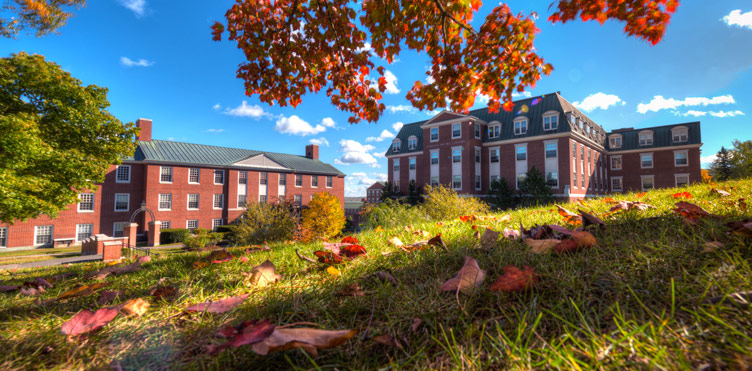Total undergraduates
36,000
International tuition fee
$25,000
School address
20 MCKAY DR
Online or distance education
Yes
Conditional admission
Yes
Number of graduate programs
100
Number of undergraduate programs
100
Number of students
30,000
Number of graduate students
8,000
Number of undergraduate students
35,000
Quick facts about our school
The University of New Brunswick is a prestigious institution located in Fredericton, Canada. Founded in 1785, it is the oldest English-language university in Canada and has a strong reputation for its quality education and research initiatives. The university offers a wide range of undergraduate and graduate programs in various fields, including arts, business, engineering, and science, attracting students from around the world.
With a focus on innovation and collaboration, the University of New Brunswick fosters a dynamic learning environment where students can engage in hands-on research projects and experiential learning opportunities. The university is committed to providing a supportive community for its students, with dedicated faculty members and state-of-the-art facilities. As a leading research institution, the University of New Brunswick contributes to advancements in various fields and plays a significant role in shaping the future of education and knowledge dissemination.
School highlights

Life at our school
Life at University of New Brunswick is dynamic and vibrant, offering students a supportive and engaging environment to pursue their academic and personal goals. The campus is bustling with activity, with a diverse range of clubs, organizations, and events that cater to a wide variety of interests. Whether you're interested in sports, music, cultural activities, or community service, there are countless opportunities to get involved and make lifelong connections with fellow students.
In addition to its academic offerings, the University of New Brunswick also prioritizes the well-being and mental health of its students. There are various support services available on campus, including counseling services, wellness programs, and academic advising. The university emphasizes a holistic approach to student success, encouraging students to balance their academic pursuits with extracurricular activities and self-care. Overall, life at University of New Brunswick is both enriching and fulfilling, providing students with the resources and support they need to thrive during their time at university.
The University of New Brunswick located in Fredericton, New Brunswick is a reputable institution known for its strong academic programs and vibrant campus community. Founded in 1785, UNB is one of the oldest public universities in North America, with a rich history of academic excellence and research innovation. The university offers a wide range of undergraduate and graduate programs in various disciplines, providing students with opportunities for academic growth and career development. With a diverse student body and dedicated faculty members, UNB is committed to creating a supportive and inclusive learning environment, fostering personal and professional growth in its students.
The University of New Brunswick (UNB) is committed to promoting a sustainable future through various initiatives and programs. With a focus on environmental responsibility and leadership, UNB aims to reduce its carbon footprint and promote sustainable practices in all aspects of campus operations. The university actively engages in research and innovation to address environmental challenges and promote sustainable development. From renewable energy projects to waste reduction strategies, UNB is dedicated to creating a more sustainable future for all its students, staff, and the broader community. By incorporating sustainability principles into its core values and practices, UNB is working towards a greener and more environmentally conscious campus for generations to come.
The University of New Brunswick (UNB) envisions being an exceptional institution dedicated to providing high-quality education, conducting impactful research, and fostering innovation and entrepreneurship. This vision is rooted in a commitment to academic excellence, diversity and inclusion, and making a positive impact on local and global communities.
Key aspects of UNB's vision include:
- Excellence in teaching and learning
- Cutting-edge research and innovation
- Fostering a diverse and inclusive community
- Engaging with local and global communities
- Developing future leaders and entrepreneurs
At University of New Brunswick, students can expect a diverse and dynamic campus experience that combines rigorous academic programs with a vibrant community atmosphere. The university offers a range of programs and courses across various disciplines, providing students with opportunities to explore their interests and develop their skills. With modern facilities, state-of-the-art technology, and dedicated faculty members, students can engage in hands-on learning experiences that prepare them for success in their chosen field. Additionally, the campus life at University of New Brunswick includes a variety of extracurricular activities, clubs, and organizations that allow students to connect with their peers, participate in events, and create lasting memories during their time at the university.
Programs offered at our schools
At the University of New Brunswick, students have the opportunity to choose from a wide range of programs to suit their academic interests and career goals. The university offers a variety of undergraduate programs across different disciplines, providing students with a strong foundation in their chosen fields. Additionally, there is a diverse selection of graduate programs available for those looking to further their education and expertise.
With a focus on experiential learning and innovative research, the University of New Brunswick is committed to providing students with a high-quality education that prepares them for future success. The programs at UNB are designed to encourage critical thinking, creativity, and collaboration, ensuring that students develop the skills necessary to excel in their chosen professions. Whether students are interested in pursuing a bachelor's degree, a master's degree, or a doctoral degree, they will find a program at UNB that meets their needs and aspirations.
The University of New Brunswick is a highly respected institution known for its strong academic programs and research opportunities. Admission to UNB is competitive, with the university looking for well-rounded students who demonstrate academic achievement, leadership potential, and a commitment to their community. Prospective students must meet specific requirements for their desired program of study, and may also be required to submit letters of recommendation, a personal statement, and standardized test scores.
UNB offers a welcoming and inclusive campus environment, with a focus on student success and support services. The university values diversity and encourages students to engage in extracurricular activities and experiential learning opportunities. With its beautiful campus in Fredericton and strong ties to industries and employers in the region, the University of New Brunswick provides a rich academic experience for students looking to excel in their studies and future careers.
The undergraduate admissions process at the University of New Brunswick in Canada considers various factors in evaluating applicants. Prospective students are encouraged to submit their high school transcripts, standardized test scores (such as the SAT or ACT), letters of recommendation, and a personal statement outlining their academic and extracurricular achievements. The university looks for well-rounded individuals who demonstrate a strong academic record, leadership potential, and a genuine interest in contributing to campus life. Admissions decisions are made holistically, taking into account the overall profile of each applicant.
Applicants to the University of New Brunswick also have the opportunity to participate in optional interviews or provide additional materials to showcase their talents and experiences. The university strives to create a diverse and inclusive academic community, welcoming students from different backgrounds and perspectives. Potential undergraduates are encouraged to reach out to the admissions office for guidance and support throughout the application process.
The University of New Brunswick in New Brunswick, Canada, is a prestigious institution known for its high-quality undergraduate programs and innovative research opportunities. The undergraduate admissions process at UNB is highly competitive, with the university seeking motivated and intellectually curious students from diverse backgrounds.
Prospective students interested in applying to UNB can expect to submit their academic transcripts, letters of recommendation, and a personal statement highlighting their academic and extracurricular achievements. Admissions criteria may vary depending on the program of choice, but all applicants are encouraged to demonstrate a strong academic record and a passion for learning. With a vibrant campus community and access to cutting-edge resources, the University of New Brunswick offers an exceptional educational experience for aspiring undergraduates.
Graduate admissions at University of New Brunswick in Canada offer a wide range of programs across various disciplines. The university is known for its strong research programs and innovative teaching methods, making it an attractive choice for graduate students seeking a quality education.
Here are a few key points about the graduate admissions process at University of New Brunswick:
- The application process typically involves submitting academic transcripts, letters of recommendation, a statement of purpose, and standardized test scores (such as the GRE or GMAT) for some programs.
- Each graduate program may have specific requirements, so it is important to carefully review the admissions criteria for your intended program.
- International students may need to provide additional documentation, such as proof of English language proficiency through tests like the TOEFL or IELTS.
- Financial aid in the form of scholarships, assistantships, and research grants may be available to help support graduate students during their studies.
- The university encourages prospective students to explore their research interests and reach out to potential supervisors before applying to ensure a good fit with the program.
Overall, University of New Brunswick offers a supportive and stimulating environment for graduate studies, with opportunities for research, networking, and personal growth.
The University of New Brunswick, located in Canada, has specific admission requirements depending on the program of study. Generally, undergraduate applicants must have completed certain high school courses with specific grades in subjects like English, math, and science. In addition to academic requirements, students may also need to submit letters of recommendation, personal statements, and/or resumes. Some programs at UNB may have additional requirements such as portfolio submissions or interviews. International students may need to demonstrate English language proficiency through tests like TOEFL or IELTS.
For graduate programs at UNB, applicants typically need a relevant undergraduate degree with a minimum GPA, along with letters of recommendation, a statement of purpose, and possibly a writing sample. Some programs may also require GRE or GMAT scores. International applicants may need to meet English language requirements and provide documentation of finances to support their studies in Canada. Meeting these admission requirements is essential for securing a spot at the University of New Brunswick and starting a successful academic journey.
The admission deadline at the University of New Brunswick varies depending on the program and level of study. For undergraduate programs, the deadline is typically in March for most programs, with some programs having earlier deadlines. For graduate programs, the deadlines are usually earlier, and it is recommended to check the specific deadline for the program you are interested in.
It is important to note that meeting the admission deadline is crucial to ensure that your application is considered for the upcoming academic year. Late applications may not be accepted, so it is best to plan ahead and submit your application well before the deadline. Additionally, make sure to carefully review the admission requirements and prepare all necessary documents in advance to avoid any last-minute complications.
At University of New Brunswick, there are various scholarships and financial aid options available to help students pursue their education. The university offers a range of scholarships based on academic achievement, financial need, and specific areas of study. These scholarships can help cover tuition costs, living expenses, and other educational expenses. Additionally, the university also provides financial aid in the form of grants, loans, and work-study programs to assist students in meeting their financial obligations while pursuing their academic goals. Overall, University of New Brunswick strives to make higher education accessible and affordable for all students through its scholarship and financial aid programs.
-
International students
-
Canadian students
-
Provincial students
Notes for the international students
See scholarships and other financial award programs on our website Also, see employment opportunities available to our international students
Keep in mind that the above are just rough estimates; the actual tuition fees vary widely, depending on many factors For a better estimate for YOU, please contact us
Managing finances as a student at UNIVERSITY- NEW BRUNSWICK is essential to ensure financial stability and security throughout your academic journey. Here are some tips to help you effectively manage your finances:
1. Create a budget: Start by evaluating your income sources, including any scholarships, part-time jobs, or financial aid. Determine your fixed expenses such as tuition, rent, and utilities, and allocate a portion of your income to savings. Limit non-essential spending and track your expenses to stay within your budget.
2. Take advantage of student discounts: Many businesses offer discounts for students with a valid student ID. Utilize these discounts for shopping, dining, entertainment, and transportation to save money on everyday expenses.
3. Plan for emergencies: Set aside a portion of your income for emergencies or unexpected expenses. Having an emergency fund can provide peace of mind and prevent financial stress in challenging situations.
By following these tips and being mindful of your spending habits, you can effectively manage your finances as a student at University- NEW BRUNSWICK. Remember to seek guidance from financial advisors on campus for additional support and resources.
At UNIVERSITY-NEW BRUNSWICK, students have the opportunity to work both on-campus and off-campus while studying. On-campus jobs are often available within the university itself, such as working in the library, administrative offices, food services, or student organizations. These positions provide convenient work schedules that can easily accommodate a student's academic commitments. Additionally, on-campus jobs may offer valuable networking opportunities and relevant experience in a student's field of study.
For those seeking off-campus employment, there are various options available in the surrounding community. Students can explore part-time positions in retail, restaurants, tutoring, or other local businesses. Many students also opt for internships or co-op placements related to their major, which can provide hands-on experience and potentially lead to full-time employment after graduation. Balancing work with studies requires good time management skills, but it can be a rewarding experience that allows students to gain practical skills and earn income to support their education.
Where does the financial assistance come from? Universities, the federal, provincial and territorial governments, individual schools, some businesses and charitable foundations give out bursaries and scholarships. Amazingly enough, over 100,000 scholarships are awarded every year, with many millions of dollars of available funds still going unclaimed because no one applies. Whether you are Canadian or an International student, you can apply for Bursaries and Sponsorships for a range of undergraduate, graduate, doctoral and post-doctoral courses at a wide range of universities so why not check with your chosen school when you apply?
If you are looking for a scholarship or financial aid for your studies, there are literally hundreds of online sources, with both government funding and private funds available. What you don’t want to fall victim to is some sort of scam, which may ask you to pay for the service of applying for a scholarship or even asking you for some sort of deposit. Here are some useful tips if you want to avoid scamming altogether.1- Remember - no authorised and responsible institution will charge you anything for enquiring about financial aid, or for applying for funds. 2- Money up front/ Application Fee - Never send money up front for an application fee - if you are asked to do so, this is definitely a scam!.3- Loan Fees - When applying for a loan, if a company asks you for a loan fee before they will release the money to you, don't go through with it. Companies add fees to your loan balance and would never ask you to pay upfront.4- Guaranteed Scholarships - There is no such thing as a guaranteed scholarship and any company that says they will guarantee you one on payment of a fee will never get back to you. 5- Company/ Scholarship Names - If you see a scholarship service or company that is using words like 'official', 'national', 'government' or other governmental or official sounding names be careful. They are most probably trying to sound official to cover up the scam.6- Phishing schemes - It may be that you get an email, a phone call or an SMS message, asking you for details like your name, address, social security number etc, along with a link to an application form on a website. This is actually a “phishing site” designed to steal your information. In general, you should never give your personal details to anyone, unless you trust them implicitly!.7- Lottery-based scholarships - If you are asked to complete a survey in return for entry into a prize draw (the prize being a scholarship) be very careful. The company providing the scholarship is making money off the information you provide by selling it to third parties. Your chances of winning are very slim and are not based on merit.8- Ask yourself, 'Is it too good to be true?' Although you may want to believe that your dream has just come true, use your common sense and do some research on the organisation involved.9- In general, never pay money - Things like application fees and service fees will be free for legitimate scholarships and you will never be asked to pay money.10- Check them out - If you have a scholarship offer that is asking for money up front, contact them personally. Real companies will be transparent in their services, location etc while scammers will usually be hard to get hold of.Lastly, always make sure that you are applying to an authorised university and that you go through their official channels when you send your personal details. You can find a comprehensive list of secondary education institutions on UniRank
Studying at University of New Brunswick involves financial considerations that students need to carefully navigate. Tuition fees, textbooks, accommodation, and other living expenses all contribute to the overall cost of pursuing a degree at the university. It is important for students to budget effectively and explore financial aid options such as scholarships, grants, and student loans to help cover these expenses. Additionally, part-time work or internships can provide students with valuable work experience and a source of income to support their studies. Planning ahead and being proactive in managing finances can help students have a successful and financially sustainable academic journey at University of New Brunswick.
At the University of New Brunswick, entrance scholarships are awarded to incoming students based on academic achievement, leadership qualities, and extracurricular involvement. These scholarships are designed to help support students financially as they begin their academic journey at the university. The amount and criteria of the scholarships vary, with some being renewable for multiple years depending on the student's academic performance. By offering entrance scholarships, the University of New Brunswick aims to recognize and reward students who have demonstrated exceptional achievement and potential, encouraging them to excel in their studies and contribute positively to the university community.
At the University of New Brunswick, entrance scholarships are available to incoming students based on academic achievement, extracurricular involvement, and community service. These scholarships are awarded to recognize and reward exceptional students who have demonstrated outstanding performance in their high school studies. The entrance scholarships at UNB provide financial support to help students pursue their academic goals and contribute positively to the university community. Students are encouraged to apply for these scholarships during the admissions process and can find more information on specific scholarship opportunities on the university's website. The University of New Brunswick is committed to supporting students in their pursuit of excellence and helping them achieve their academic and personal aspirations.
At University of New Brunswick, merit scholarships are awarded to students based on their academic achievements, leadership qualities, and extracurricular involvement. These scholarships are meant to recognize and reward students who have demonstrated exceptional performance in their high school coursework and beyond. The average percentage required to be eligible for a merit scholarship at University of New Brunswick varies depending on the specific scholarship program, but generally, students with a high academic standing and impressive extracurricular activities are more likely to receive these awards. These merit scholarships not only help to reduce the financial burden of college tuition for students, but also serve as a recognition of their hard work and dedication to their studies.
Scholarship donors at the University of New Brunswick play a crucial role in providing financial support to students pursuing their educational goals. These donors are typically individuals, organizations, or companies who generously contribute funds to create scholarship opportunities for students. Their contributions help alleviate the financial burden of higher education and enable students to focus on their academic pursuits without worrying about the cost.
Through their generosity, scholarship donors not only support individual students but also invest in the future workforce and leaders of society. By providing financial assistance to students, these donors empower individuals to reach their full potential and achieve their academic and career aspirations. The impact of scholarship donors at the University of New Brunswick is significant, as their contributions make education more accessible and help create a more inclusive and equitable learning environment for all students.
Scholarships at University of New Brunswick are intended to provide financial assistance to students to help alleviate the burden of tuition fees and living expenses. These awards aim to recognize academic excellence, support student success, and promote access to higher education for students with financial need. The funds from scholarships can be used to cover tuition costs, purchase textbooks, and offset living expenses such as accommodation and food. By offering scholarships, University of New Brunswick strives to attract and retain high-achieving students, foster a diverse and inclusive student body, and contribute to the overall academic success and well-being of its students.
Scholarships at the University of New Brunswick serve a vital purpose in supporting students in their academic pursuits. These scholarships help alleviate the financial burden of pursuing higher education, making it more accessible and attainable for students from various backgrounds. By providing financial assistance, scholarships enable students to focus on their studies, engage in extracurricular activities, and gain valuable experiences that will set them up for future success. Additionally, scholarships at the University of New Brunswick recognize and reward academic excellence, motivating students to strive for their best and achieve their full potential. Overall, scholarships play a crucial role in fostering a diverse and talented student body, contributing to a vibrant and dynamic learning environment at the university.
The University of New Brunswick (UNB) has two main campuses located in Fredericton and Saint John in the province of New Brunswick, Canada. The contact information for the Fredericton campus is as follows: Address - 3 Bailey Drive, Fredericton, NB E3B 5A3, Canada. Phone - 1-506-453-4666. Email - info@unb.ca. For the Saint John campus, the contact information is: Address - 100 Tucker Park Road, Saint John, NB E2L 4L5, Canada. Phone - 1-506-648-5670. Email - info@unb.ca.
In addition to the main campuses, UNB also has several other locations and facilities. For example, the UNB College of Extended Learning is located at 6 Duffie Drive, Fredericton, NB E3B 0R6, Canada, and can be reached by phone at 1-506-453-4646 or email at cel@unb.ca. The UNB Associated Alumni is located at 676 Windsor Street, Fredericton, NB E3B 5A2, Canada, and can be contacted at 1-506-453-4847 or alumni@unb.ca. Overall, UNB offers a variety of ways to get in touch with the university and its various departments and facilities.





